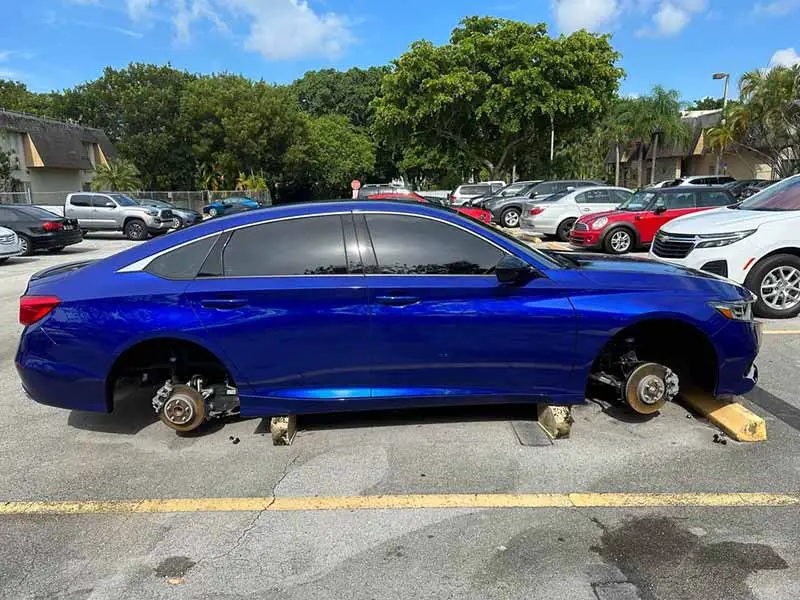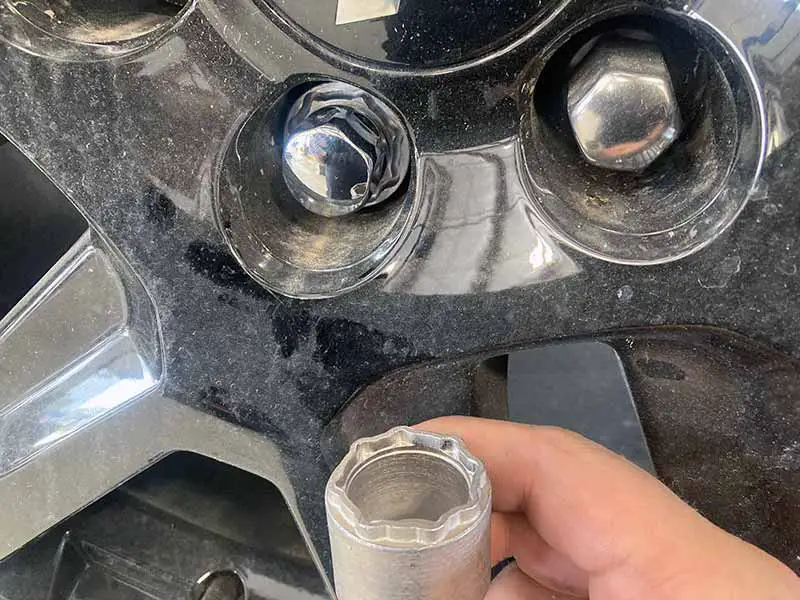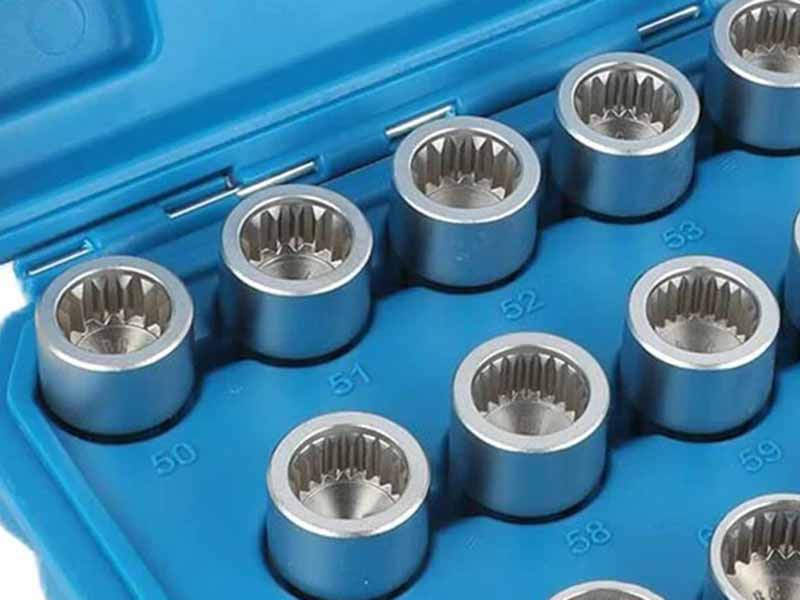Imagine this: You’re cruising down the road and BANG! You have a flat tire. But wait, you suddenly realize you can’t find that peculiar little tool – the wheel lock key. It’s a small piece of equipment, but without it, you’re going nowhere.
What Is A Wheel Lock Key?
A wheel lock key is a specialized socket required to install or remove wheel locks on a vehicle’s wheels. It’s designed to match a unique pattern on the wheel lock, ensuring the tire, rim, and wheel can’t be easily removed without it.
In this article, we explore the various aspects of a wheel lock key, including its functionality, different types, where to find it in your vehicle, and steps to take if it’s lost or misplaced.

McGard Wheel Locks
Defining the Wheel Lock Key
You might have heard of wheel locks, those nifty little devices that keep your car’s wheels safe from theft. But what about the key that operates these locks? Let’s dive into what a wheel lock key is and why it’s a crucial piece of your car’s security puzzle.
The Essence of a Wheel Lock Key
- A Specialized Tool: At its core, a wheel lock key is a uniquely designed tool. It’s used specifically for installing and removing wheel locks on your vehicle’s wheels.
- Security-Enhanced Design: Unlike standard lug nut wrenches, a wheel lock key has a distinctive pattern or shape. This design aligns with the corresponding wheel lock, making it the only tool that can effectively engage and turn the lock.
Wheel locks may deter some thieves but will only slow down the determined ones.
TireGrades Expert Tip
The Unique Role in Vehicle Security
- Theft Deterrence: The wheel lock key is integral to the function of wheel locks. Without it, removing the locks — and thus, the wheels — becomes significantly more challenging for would-be thieves.
- Customized Fit: Each wheel lock key is often unique to its set of wheel locks. This customization adds an extra layer of security, as only the specific key can remove the locks.
Recognizing a Wheel Lock Key
- Physical Appearance: Generally, wheel lock keys are small, metallic, and have a peculiar patterned end that differentiates them from regular lug wrenches or sockets.
- Variations in Design: Depending on the brand or type of wheel locks you have, the key’s design can vary. Some might have a spline pattern, others might be hexagonal, and so on.

How Wheel Lock Keys Work
Understanding the mechanics of how a wheel lock key operates is not just about technical know-how – it’s about appreciating the ingenuity behind this small yet vital component of your car’s security system.
The Interaction with Wheel Locks
- Unique Pattern Alignment: Each wheel lock key has a specific pattern or code that aligns precisely with the corresponding wheel lock.
- Engagement Process: When inserted into the wheel lock, the key’s pattern matches the lock’s internal design, allowing it to engage and turn the lock.
Ensuring Security
- No Standard Fits: The uniqueness of the key pattern means standard tools can’t mimic its function. This uniqueness is what keeps your wheels secure.
- Tailored to Your Locks: Often, each set of wheel locks comes with a key that is tailored specifically for those locks, enhancing the security aspect.
Practical Usage
- Installation and Removal: The wheel lock key is used to tighten (install) or loosen (remove) the wheel locks when changing or servicing your vehicle’s tires.
- Ease of Use: Despite their unique designs, these keys are user-friendly. With the correct alignment, turning and operating the key is straightforward.
Tips for Proper Use
- Align Carefully: Ensure the key is correctly aligned with the lock before applying pressure to prevent damage.
- Avoid Excessive Force: If the key doesn’t fit or turn easily, double-check the alignment. Forcing the key can damage both the key and the lock.

Different Types of Wheel Lock Keys
Not all wheel lock keys are created equal. Depending on your vehicle and wheel type, you might encounter different styles of wheel lock keys. Let’s explore these varieties to help you identify and understand the one that belongs to your vehicle.
Exploring the Styles
- Spline-Patterned Keys: Characterized by thin grooves and ridges, these keys are common for aftermarket wheels.
- Hexagonal Keys: Resembling a standard hexagon shape, these keys are often used for factory-installed wheel locks.
- Internal/External Pattern Keys: These may feature patterns on the inside (internal) or outside (external) of the key head, designed to match corresponding wheel locks.
Vehicle and Wheel Considerations
- Type of Vehicle: The make and model of your car or truck can influence the type of wheel lock key. For instance, luxury vehicles might have more complex lock designs.
- Wheel Type: Custom or aftermarket wheels often require different types of wheel lock keys compared to standard factory wheels.
Key Identification
- Visual Inspection: By closely examining the pattern and shape of the wheel lock, you can determine the type of key needed.
- Consulting the Manual: Your vehicle’s manual or documentation from the wheel lock manufacturer can provide insights into the type of key required.

Locating Your Vehicle’s Wheel Lock Key
One of the most common issues faced by vehicle owners is locating the wheel lock key when it’s needed. Whether you’re changing a tire or need to access the wheel for maintenance, knowing where to find this key is essential.
Common Places to Look
- Glove Compartment: Often the first place to check. Many vehicle owners keep the wheel lock key here for convenience.
- Trunk: Near the spare tire or in the tool kit provided with the vehicle.
- Under the Driver’s Seat: Some people prefer to keep it out of sight for added security.
- With the Jack and Lug Wrench: If your vehicle has a designated spot for tire-changing tools, the wheel lock key might be there.
Tips for Storing the Wheel Lock Key
- Easy-to-Remember Spot: Choose a location that’s both accessible and memorable.
- Avoid Loose Storage: Store the key in a secure bag or case to prevent it from getting lost or damaged.
- Inform Family or Co-Drivers: Ensure that anyone else who might drive the vehicle knows where to find the key.
In Case of a Rental or Used Vehicle
- Ask the Dealer or Rental Agency: If you’ve just bought a used car or are renting a vehicle, check with the dealer or rental agency about the wheel lock key’s location.
- Inspect the Vehicle Upon Delivery: Make it a point to locate the wheel lock key as soon as you take possession of the vehicle.

Wheel Lock Removal Kit
What To Do If Your Wheel Lock Key Is Lost
Losing a wheel lock key can be a frustrating experience, especially if you need to access your wheels urgently. However, there are steps you can take to resolve this situation without too much hassle.
Immediate Steps
- Don’t Panic: Losing a wheel lock key is a common issue and can often be resolved.
- Check Your Vehicle’s Documentation: Sometimes, the key code or replacement information is provided in your vehicle’s manual or maintenance records.
- Contact Your Dealer: If you bought your car from a dealership, they might be able to provide you with a replacement key or assist in removing the wheel locks.
Replacement Options
- Ordering a New Key: If you have the code for the wheel lock, you can often order a new key directly from the manufacturer.
- Professional Removal Services: In case you can’t get a replacement key, many tire shops and garages offer services to remove wheel locks without the key.
Preventing Future Loss
- Keep a Record of the Key Code: Always store the key code in a safe place. This code is essential for ordering replacements.
- Consider a Spare Key: If possible, purchase a spare wheel lock key and store it in a separate, safe location.
- Regular Checks: Make it a habit to periodically check that the wheel lock key is in its designated spot.
Resources
Below are some links you may find helpful when learning about tires:
- Wheel locks: What are they and do they work? – CaptialOne.com
- How to remove a wheel lock without a key – IFIXIT.com
Final Thoughts
Whether you’re dealing with aftermarket or factory-installed wheel locks, knowing how your wheel lock key works, where to find it, and how to maintain it can save you time and trouble.
This small tool is the guardian of your wheels, and losing it can be more than just an inconvenience.
Always keep it in a safe, memorable place, and consider getting a spare if possible.
Good luck and happy motoring.





